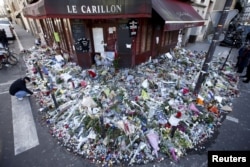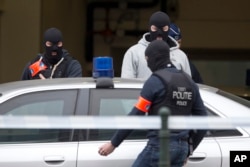European intelligence officials say they don’t know exactly how many assassins and bombers the Islamic State terror group has trained to conduct deadly attacks in Europe like Tuesday’s in Brussels. Officials fear, however, they are facing hundreds of potential assailants, either trained in camps in Syria or recruited through kinship and crime networks in Europe by returning IS volunteers.
Estimates of IS jihadists ready to carry out out attacks range from as low as 200 to up to 400. “We just don’t have any real precision on how many dedicated and trained operatives they have on the continent,” a senior French intelligence official told VOA. “The estimates in the end are guesses,” the official admitted.
Last year, a smuggler on the Syrian-Turkish border claimed to U.S. news-site Buzzfeed that the terror group "had sent some 4,000 fighters to Europe.” Belgian and French Intelligence officials say they doubt the figure is that high of fighters plotting attacks in Europe; but, they are acutely aware that more than 5,000 Europeans have over the last few years joined the terror group and that as they trickle back, the danger of terrorism increases exponentially.
The officials say IS is better placed to wage a sustainable and deadlier terror campaign than al-Qaida was able to manage after the attacks on New York and Washington on September 11, 2001.
And analysts agree with that assessment.
“It has many more resources, capacities and experiences compared with those of al-Qaida,” according to Omar Ashour, a senior lecturer in security studies at the Institute of Arab and Islamic Studies at Britain’s University of Exeter.
“These are not only demonstrated by ISIS's control of territory stretching from parts of Aleppo in Syria to parts of Salah al-Din province in Iraq, in which about 10 million people live, but also by the capacity of ISIS to strike in areas where they do not have that control,” he said, using another acronym for Islamic State.
Al-Qaida has had little success with complex operations against targets in the West since 9/11. The group's highly active Arabian Peninsula branch has made several efforts to bomb Western airlines but seen them all foiled or botched. In contrast, since August 2014, IS and its affiliates have conducted at least 25 plots against Westerners, either in nearby North Africa or on European soil. Before then, it was behind just three attacks on Western targets.
The rapid increase in the tempo and complexity of IS attacks is alarming and fulfilling exactly what the group intends them for, says Shashank Joshi, a senior research fellow at the Royal United Services Institute. “The purpose of any of these attacks is get the headline, show the capability of the network and provoke fear among European public,” he says.
Rising fear
And that fear is rising. So is the political and public clamor for a rapid fix to the lapses in the continent’s security services.
As the IS terror campaign has morphed abruptly from so-called lone-wolf attacks and simpler hit-and-run shooting sprees - such as the Brussels museum attack in May 2014, in which a single gunman killed four people - into coordinated assaults targeting multiple locations simultaneously involving several assailants, the opportunities for leaks increase as do the chances for electronic or human intelligence to pick up outlines of plots.
Even so, the Belgian and French security services were unable to prevent last November’s attacks in Paris or Tuesday’s deadly terrorism. It took the Belgians 125 days to capture Salah Abdeslam, who oversaw the logistics for the Paris attacks, and was wounded and apprehended after a brief shoot-out, even though he had remained holed up in a Brussels suburb.
Much of this week’s criticism of the Belgian security services has focused on perceived lapses in intelligence-sharing.
Ibrahim and Khalid El Bakraoui, the two suicide bombers at Brussels’ Zaventem airport, were on the terrorism watch list in the United States. Ibrahim El Bakraoui was able to skip parole after serving part of a nine-year sentence for armed robbery, leave for Syria and be deported from Turkey as a “foreign terrorist fighter” without Belgian authorities flagging him as an Islamic militant.
“If you put all things in a row, you can ask yourself major questions,” Belgian’s interior minister, Jan Jambon, said this week.
Intelligence sharing
As in the wake of the Paris attacks, plotted on Belgian soil, Belgium's government has vowed to overhaul the security services and improve intelligence-sharing among the country’s federal and local law-enforcement agencies divided between Flemish and French speakers and with European neighbors.
Meeting Thursday, European Union justice and interior ministers pledged, as they did before in November, to improve joint intelligence-gathering and push through measures to share airline passenger information.
The challenges don’t only rest with failures in intelligence-sharing. Resources are crucial, too. All European security services are overwhelmed - short of the necessary skilled analysts needed to sift through and make sense of the huge amount of information provided by electronic data surveillance. They are also short of the intelligence manpower needed to investigate and monitor suspects.
In November, former French intelligence counterterrorism chief Louis Caprioli told the Financial Times in an interview that 18 to 20 officers were required to monitor any one terror suspect for 24 hours a day. French authorities have watch lists of 20,000 people considered to have ties in varying degrees to radical Islam. “Materially, physically, you cannot keep watch on 20,000 people round the clock,” he said. Using Caprioli’s ratio, It would need 400,000 intelligence operatives to do so.
Likewise, British intelligence has around 4,000 officers employed by the country’s domestic intelligence organization, MI5, as well as 6,000 employees at Britain’s electronic eavesdropping agency, GCHQ. Britain has more than 3,000 suspects on its watch list - for all to be under surveillance 24 hours a day would require up to 60,000 intelligence officers.
Belgium currently employs about 700 people in its civil intelligence service with about 800 working in military intelligence. Those intelligence officers also have to help provide security for the government and EU institutions and assess and counter other threats including a highly active Russian intelligence operation focused on NATO, analysts say.
Belgian authorities plan to hire an additional 1,000 police, prosecutors and security agents to focus on the IS threat. According to the country’s justice ministry, about 117 Belgians are estimated to have returned from fighting in Syria and to keep tabs on them them would require at least 2,340 intelligence officers, leaving no one to monitor hundreds of others on watch lists who have closely-knit kinship ties or other connections to radical Islamists.











